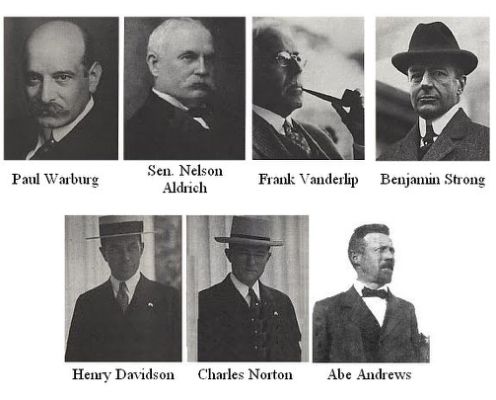The Federal Reserve Act of 1913 - Quick History #2

Amongst a smoke filled room lit only with dim candles you can hear ice bathed in gin rattling against crystal glasses. Hidden in the bog of swampy Georgia Nelson Aldrich, A. Piatt Andrew, Henry Davison, Arthur Shelton, Frank Vanderlip and Paul Warburg gathered on Jekyll Island in October of 1910 to devise a plan for establishing the a central bank of the United States, the Federal Reserve.
There hadn't been a central bank since President Andrew Jackson vetoed the charter for the second bank of the United States in 1832. Americans naturally feared central banking as they had been caught doing unscrupulous things in the past.
Out of this meeting came the Aldrich plan. 15 regional banks called "National Reserve Associations" would fall under the umbrella of the "National Board of Commercial Bankers". They would provide emergency loans to member banks and control the printing of money to provide elasticity to the market. The problem, it would be controlled by private bankers.
After the secret meeting universities were employed to promote the Aldrich plan. Princeton, Harvard and the University of Chicago were ground zero for propaganda. Former university President Woodrow Wilson lead the National propaganda campaign stating "All this trouble could be averted if we appointed a committee of six or seven public-spirited men like J.P. Morgan to handle the affairs of our country."
Ultimately the measure failed to pass Congress. The public was unwilling to leave private bankers in charge of the National monetary system.
The election of 1912 seem clearly in the hands of the Republican party who was popular at the time and the country was in a time of general prosperity. Howard Taft (incumbent Republican) was running for a second term as president against Woodrow Wilson (Democrat). Both parties included a monetary plan for the country, but the republicans supported the Aldrich plan which had already been denounced as a fraud. The Democrats proposed the Federal Reserve Act, virtually the same as the Aldrich plan, under a more palatable name.
Woodrow Wilson won the election and paved the way for the Federal Reserve Act to pass. On December 23rd 1913 Congress passed the federal reserve act, allowing private banks to assume full monetary control of our country.
3 years after its passage Woodrow Wilson stated "I have unwittingly ruined my country. A great industrial nation is controlled by its system of credit. Our system of credit is concentrated. The growth of the nation, therefore, and all our activities are in the hands of a few men. We have come to be one of the worst ruled, one of the most completely controlled and dominated Governments in the civilized world - no longer a Government by free opinion, no longer a Government by conviction and the vote of the majority, but the Government by the opinion and duress of small groups of dominated men."
President Woodrow Wilson <--- Worst. President. Ever!
He's definitely in the top 5!
The first 4 for the erosion of the Constitution. The last one, because he hates the country he was at the top of.
I can see some redeeming qualities in 2-4. Wilson was a racist, state-worshiping disaster. Obama did nothing other than advance the march of government. FDR won the war while advancing a horrible domestic program. Lincoln freed the slaves, but enhanced central-government power. LBJ signed the voting-rights and civil-rights acts but brought the federal government to every nook and cranny of this country (not good!).
Dude, great list. Its funny because lincoln is regarded as an icon, but the facts show him in a different light, a power centralizing facist.
It is a two-sided coin with Lincoln. Who knows how someone else would have handled the situation.
If the country did split, there would probably have been a bigger and more deadly war between the two countries later.
I'm actually surprised that another country didn't try to take advantage of the situation. Well, Mexico tried and we all know how that ended for them.
That is true, you could argue Lincoln a number of ways. It was a time of war, and the country was falling apart, maybe he went to far maybe not. But his lasting impact was that of centralization, which I personally dislike.
Very interesting article to read @americana-reboot. Wish there were more posts like this on Steemit. I upvoted and followed you.
Thanks! I do a little of both, commentary and deeper content. I've got more coming!